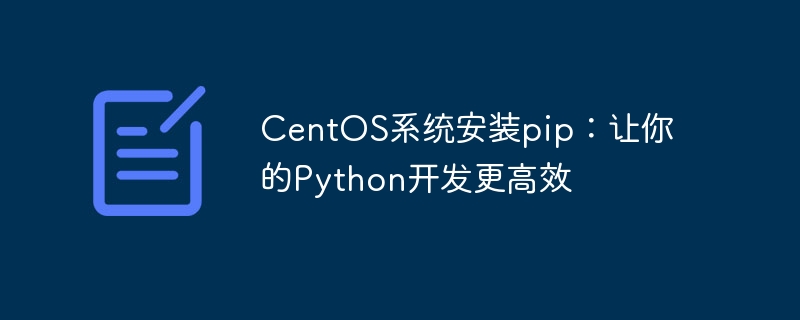

CentOS system installation pip: Make your Python development more efficient
Introduction:
Python is an easy-to-learn, powerful programming language , widely used in website development, data analysis, artificial intelligence and other fields. In the Python development process, it is very common to use third-party libraries, and pip (pip install package) is a Python package management tool that can help developers easily install, upgrade, and delete Python packages. This article will introduce how to install pip on CentOS system to make your Python development more efficient.
Step 1: Install EPEL source
To install pip on CentOS system, you need to install EPEL source (Extra Packages for Enterprise Linux) first. EPEL source is software developed by the Fedora community and maintained by CentOS. source, providing a rich set of third-party software packages.
yum install epel-release
yum update
Step 2: Install pip
yum install python-pip
pip --version
If the version information of pip appears, the installation is successful.
Step 3: Upgrade pip
pip itself also needs to be constantly updated to support new features and fix known issues. After installing pip, you need to upgrade to the latest version through the following command:
pip install --upgrade pip
Step 4: Change the domestic source (optional)
By changing the domestic mirror source of pip, the download speed can be improved .
vi ~/.pip/pip.conf
[global] index-url = http://mirrors.aliyun.com/pypi/simple/
Now, you can happily use pip to install various Python packages on CentOS systems. Here is a specific example demonstrating how to use pip to install the Django framework:
pip install django
django-admin --version
If the version information of Django appears, the installation is successful.
Through the above steps, you have successfully installed pip on the CentOS system, and you can use pip to easily install various Python packages. Using pip can greatly improve your Python development efficiency and make your development work easier and more efficient.
Summary:
This article introduces you to the detailed steps of installing pip on CentOS system. I hope it can help you. In Python development, using pip is an essential tool. It can easily manage third-party libraries and packages, making your development work more efficient. If you are a CentOS system user, I hope you can successfully install pip through the guidance of this article and enjoy a more convenient Python development experience. Happy programming everyone!
The above is the detailed content of Improve Python development efficiency: Install pip on CentOS system. For more information, please follow other related articles on the PHP Chinese website!




